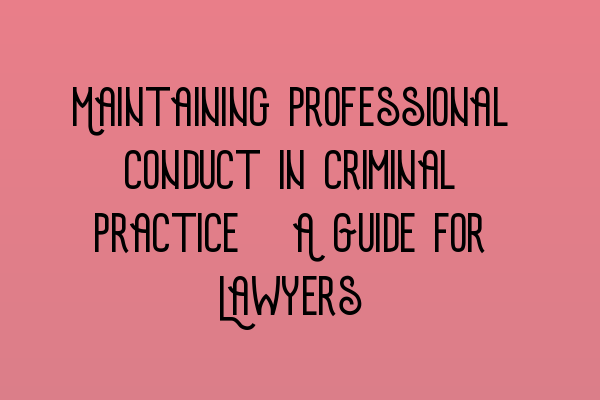Maintaining Professional Conduct in Criminal Practice: A Guide for Lawyers
As a criminal law practitioner, it is imperative to uphold the highest standards of professional conduct. Your conduct not only reflects upon you as an individual, but also on the legal profession as a whole. Clients trust their lawyers to defend their interests and to advocate for justice.
In this comprehensive guide, we will delve into the essential principles and practices that every criminal lawyer should adhere to, ensuring integrity, competence, and respect in their professional conduct.
1. Ethical Obligations
Lawyers must act with utmost integrity and ethical behavior at all times. This means exercising good judgment, maintaining client confidentiality, avoiding conflicts of interest, and adhering to the principles outlined in the Solicitors Regulation Authority (SRA) Code of Conduct.
It is vital for criminal lawyers to keep up to date with the latest legal developments, including changes in legislation and case law. Continuous education and professional development are key to maintaining competency. Engaging in SQE 1 Practice Exam Questions and SQE 1 Practice Mocks FLK1 FLK2 can assist in honing your skills and knowledge.
Furthermore, participating in SQE 2 Preparation Courses and SQE 1 Preparation Courses can provide you with the necessary tools and guidance to excel in your criminal law practice.
2. Client Confidentiality
One of the cornerstones of legal ethics is client confidentiality. As a lawyer, you have a duty to protect the confidentiality of your clients and their information. This duty extends even after the professional relationship ends.
It is crucial to maintain strict confidentiality in all communication with clients, whether in person, via email, or over the phone. Avoid discussing sensitive information in public places and ensure that all electronic communications are secure.
If you need to share information with other professionals involved in a case, obtain your client’s consent and ensure that their confidentiality is maintained. Remember, a breach of client confidentiality can result in severe consequences, both legally and professionally.
3. Effective Advocacy
Being an effective advocate requires excellent communication skills and a deep understanding of the law. It is your responsibility to represent your clients vigorously and ethically in court. This involves presenting compelling arguments, cross-examining witnesses, and respecting the principles of fairness and justice.
To enhance your advocacy skills, it is important to stay informed about the latest legal precedents and to continuously improve through feedback and practice. Utilizing SQE 1 Practice Exam Questions and SQE 1 Practice Mocks FLK1 FLK2 can help you sharpen your legal analysis and improve your ability to construct persuasive arguments.
4. Professional Relationships
Building strong professional relationships is fundamental to a successful criminal law practice. Treat your colleagues, courtroom personnel, and opposing counsel with respect and courtesy. Effective communication and collaboration can lead to more favorable outcomes for your clients.
Networking within the legal community can provide valuable opportunities for professional growth and development. Engaging in SQE 2 Preparation Courses can help you establish connections with other legal professionals and expand your knowledge base.
5. Continued Professional Development
The legal profession is constantly evolving, and it is essential for criminal lawyers to stay up to date with the latest developments. Continued professional development is crucial in maintaining competence and excellence in your practice.
Participating in relevant training programs, attending legal seminars and conferences, and pursuing advanced certifications can enhance your skills and knowledge. Stay informed about SRA SQE Exam Dates and prepare adequately to demonstrate your expertise.
In conclusion, maintaining professional conduct in criminal practice is of utmost importance. Upholding ethical obligations, maintaining client confidentiality, being an effective advocate, fostering professional relationships, and engaging in continued professional development are all critical components of professional conduct.
By adhering to these principles, criminal lawyers can not only achieve success in their practice but also contribute to the integrity and credibility of the legal profession as a whole.
Related Articles:
- SQE 1 Practice Exam Questions
- SQE 1 Practice Mocks FLK1 FLK2
- SQE 2 Preparation Courses
- SQE 1 Preparation Courses
- SRA SQE Exam Dates
